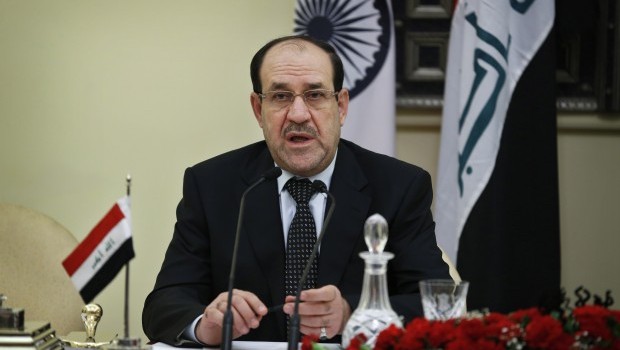
Iraqi Prime Minister Nouri al-Maliki speaks during an official visit to India on Aug. 23, 2013 (AP Photo/Saurabh Das)
Nujaifi said: “It seems that the government in Baghdad has more important concerns than the success of the province of Nineveh, or its security and economic stability,” pointing out that “there are parties who do not want us to work on the development of the infrastructure of the province.”
He told Asharq Al-Awsat by telephone from his office in the city of Mosul that “there are no security or technical reasons for the decision to close the airport because Mosul international meets all technical requirements. We were talking on Monday with international companies specialized in airports about installing additional navigation equipment to improve the technical capability of the airport.”
He added that “after learning of the decision, we thought the reasons that prompted Baghdad to close the airport may have been technical, but experts at the airport confirmed that airport met all technical and security requirements.”
A senior security source at Mosul Airport told Reuters that “at first the authorities said there was information about a hijacked plane and then they said the closure was for maintenance, but there was no maintenance work.” He added that Prime Minister Nuri Al-Maliki had ordered the closure, but it was not possible to get immediate comment from the Prime Minister’s Office.
Maliki has had disagreements with the governor of Mosul on several issues in recent years, including Nujaifi’s support for the Sunni minority’s protests against the government.
Nujaifi said “the decision to close the airport was made by the office of Prime Minister Nuri Al-Maliki and not the Ministry of Transport or the Civil Aviation Authority, who have the right to close any airport for technical reasons.” He added that “we in the province, thought the reason was due to the situation in Syria, or that there were security concerns, but we know that the situation in Syria has nothing to do with us or with the closure of the airport, and we came to the conclusion that the government decided the airport should be closed without giving reasons.”
The Nineveh governor added that “there is a decision in Baghdad that Nineveh province should remain weak and not have any authority, instead of supporting the efforts of the provincial council in building economic and security stability, and bring prosperity to its citizens,” pointing out that “the decision to close the airport comes at a critical time because it is the Hajj season, which is a very busy time for the airport, when pilgrims travel to Mecca, in addition to the plan on September 17 to welcome the first flight by Royal Jordanian Airlines from Amman and the launch of a new route between Amman and Mosul. There is also an agreement to launch a route with Turkish Airlines, but unfortunately, all of these projects will not go ahead because of the decision to close the airport.”
The differences between central government and the province on the issue of oil investments in Nineveh may have become worse, Nujaifi said: “There is an investment project proposed to the council to build an oil refinery and we are awaiting the decision of the council to approach the Oil Ministry in Baghdad, although we expect it to be rejected.”
He pointed out that “oil reserves in the province are estimated at 20 billion barrels of crude oil. There are 20 oil fields in the province which were discovered under the former regime, and 40 geological sites yet to be explored. The council wants to work according to the oil policy in force in the Kurdistan region, and we are waiting for the publication in the Official Gazette of the law governing the powers of provincial councils, which grants broad powers to provinces, including oil investment.”
Meanwhile, an arrest warrant was issued yesterday by the Court of Integrity in Baghdad against the governor of Nineveh Province. Nujaifi said “the warrant was issued based on a complaint by a prisoner serving a prison sentence on 19 charges of fraud, accusing me of committing an illegal act when in 2009, I saved forged real estate documents which were about to be burned. I formed a committee which delivered the documents to the Iraqi Ministry of Justice due to their importance.”
